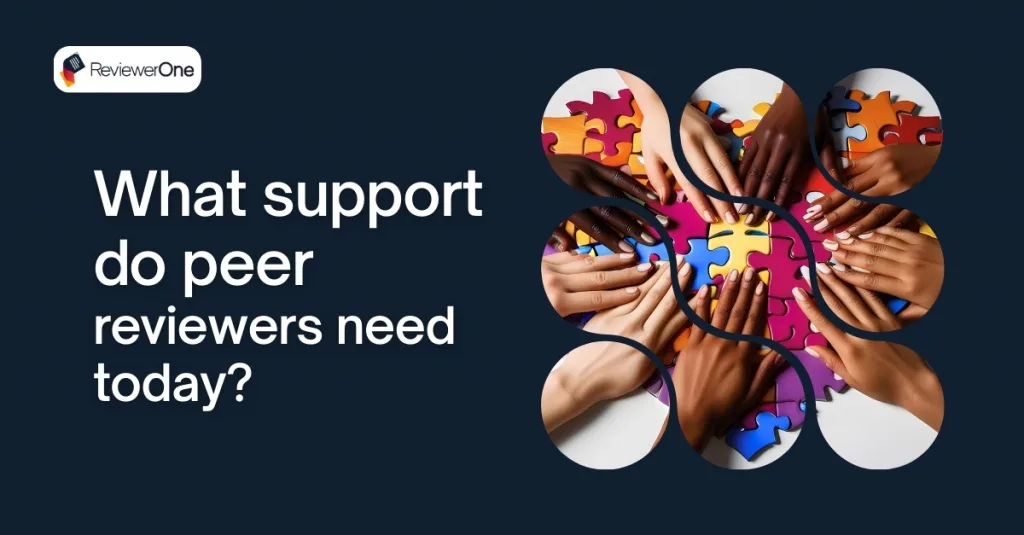Peer review is often described as the cornerstone of scholarly publishing. It is the essential step that helps the scholarly community ensure that science can be trusted, tested, and built upon. However, the peer review system does not uphold this cornerstone by itself. Peer reviewers constitute the central piece in this system. Behind every peer-reviewed manuscript is a researcher who, despite their own academic and personal commitments, have volunteered to dedicate the time to read, critique, and help improve another author’s work. This reality invites an important question: what kind of support do reviewers need to perform peer reviews efficiently?
Challenges faced by reviewers
While the principle of peer review remains unchanged, the context in which reviewers work has shifted. Reviewers, today, face several challenges.
- Time pressures and workload: Academic life has its own set of challenges and demands. Researchers often juggle multiple roles such as teaching, mentoring, securing funding, producing their own publications, or fulfilling administrative obligations. Even though peer review is vital, it is likely to get squeezed into evenings, weekends, or travel time.
- Lack of recognition: The academic system often celebrates output such as papers published, grants secured, or citations earned. While peer review contributes directly to the quality of research output, it is rarely considered in formal evaluations. For early-career academics, this lack of recognition can be particularly discouraging.
- Limited training and guidance: For novice peer reviewers, dealing with the first peer review invitation could be both an honor and a source of anxiety. How should they respond to this first invitation? How can they identify fatal flaws in manuscripts without discouraging authors? What ethical issues should they be looking for? Reviewers need structured guidance on such aspects.
- The burden of responsibility: Reviewers shoulder the responsibility of evaluating work that may represent years of effort by authors. They are expected to balance objectivity with empathy, irrespective of how challenging the peer review is. The weight of this responsibility can lead to fatigue, particularly in high-pressure situations.
What reviewers need
- Recognition: Reviewers need more than expressions of gratitude. They need concrete forms of recognition, support, and empowerment.
- Training: Novice peer reviewers benefit from structured training programs that go beyond the how-to guidance format to address more complex aspects such as ethical responsibilities, avoiding unconscious bias, and ensuring reviews that are both rigorous and constructive.
- Practical support and tools: Tools that can assist with aspects such as plagiarism check, statistical validation, and reference formatting could enable reviewers to focus on substantive scientific critique. Clearer journal guidelines, communication from editors, and manageable review deadlines would also help.
- A sense of belonging and community: Despite being an act of scholarly citizenship, reviewing can be isolating. Peer reviewers would benefit from having access to a community of reviewers. This can ensure that they feel part of something larger than a necessary process.
How are reviewers being supported?
Several scholarly publishing initiatives support peer reviewers. For example, Publons (Clarivate) and ORCID provide verified reviewer profiles. ReviewerCredits offers redeemable benefits. Several publishers offer certificates, thank-you notes, or future discounts on publishing fees. Structured training in peer review has also grown in recent years. Scholarly societies often foster recognition by highlighting reviewer contributions during annual meetings or providing member benefits. Global initiatives like Peer Review Week highlight the role of peer review and provide a sense of community.
New platforms like ReviewerOne aim to support peer reviewers by providing a robust peer review management system, AI-assisted tools to support peer review, reviewer upskilling through training programs and resources, reviewer recognition in partnership with industry stakeholders, and a community forum to interact with others. Such all-inclusive support is essential to help peer reviewers feel empowered an valued.
Re-centering the human in peer review
Peer review involves generosity, judgment, and a willingness to give time that could be spent elsewhere. For peer review to thrive, the people who sustain it need meaningful support. They need recognition that advances their careers, training that empowers them, tools that ease their workload, and communities that affirm their contribution. Without these, the system risks overburdening reviewers and eroding the goodwill on which it depends. Providing peer reviewers with necessary tools, resources, training, and recognition will enable them to continue upholding the integrity of science.









Leave a Comment